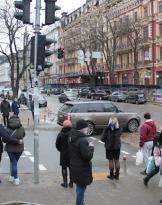Ukraine with spring is less news. There was no resumption of hostilities in style. The snow goes away but all the rest remains. Donetsk airport, flooded at the time of European football, is an open-air scrapyard: a tongue of rubble, craters and carcasses. The gray sky looks like a torn pinstripe suit. It's cold in Ukraine, even if it's no longer time.
In a tornado building there is the headquarters of Givi, the commander of the battalion "Somalia", the most beautiful fig tree in the New Russia basket. "Somalia" because there are some differences between its boys and boy scouts ... For Ukrainian media are tagliagolous terrorists; for the Donbass people, courageous patriots.
Approaching it is difficult since the EU has aimed for human rights violations. With journalists there is more sarcasm than love. Here the estimate goes only to those who fight.
Even the ATO (Anti Terrorism Operation) issued by Kiev does not help. The Donbass militia somehow laugh at us, some of us cling to us.
Givi lets himself be photographed, however, while smoking with his personal bodyguards stuffed with weapons. He smokes like a Turk, but ironically, he smokes Armenian cigarettes. The Caucasus has it on us; perhaps they are cigarettes or perhaps, as some say, it is abcased. It is not a Latin motorcycle, but a citizen of Abkhazia, a strip of Georgia that at the collapse of the USSR turned its terga in Tbilisi to look at Moscow.
Woe to tell Givi though. Sukhumi and all of Abkhazia are also part of Mother Russia for him. For the Caucasus, the story of the characters of Michail Lermontov is valid: where Russia begins and ends depends on the interlocutor.
To think about it Givi, a student of Mikhail Tolstykh, is Caucasian in all. Although very tall, it resembles more a South Sudan than a Siberian. It's a mix between George Clooney without a voice and Valerio Mastandrea with the circles of war months. He says he was born in Ilovaisk, behind Donetsk and feeling Russian forever. It is disgusting and narcissistic, but perhaps better than it is to believe. It has become popular with youtube. It was raining Cityhe did not smoke, but he smoked it quietly ...
Smoke is a refrain in Ukraine: explosions, cold breath, tea cups, drains of wagons, rubble, cigarettes, Western media ... is all a smoke from Ukraine. Gray smoke like the sky and face of Givi.
He knows he likes it; repeats its part with the name in Cyrillic and the patch with the Russian flag on the camouflage jacket. He brings with him a Makarov who wields occasionally to help his myth.
It was he who chased the "cyborgs" (the soldiers of Kiev) from the Donetsk airport. He along with Motorola, which is not a mobile phone but the nickname of Pavlov, the commander of "Sparta", special battalion became legend in the Donbass. They both have great wagon warfare experience. Their fame was born in September at Ilovaisk, with the first great defeat of the Ukrainian army.
To get to the airport, just join the press. In order to enter the restricted areas instead, you have to pay an "invitation". War has a price in everything. By now the "terminal" is a monument to victory over the Ukrainian coupers.
In front of the ugly building of Givi there is a BMP car park and empty ammunition boxes. There is no window, a balcony, a piece of wall without the signs of war.
Givi is proud of it. "Who is not in the forefront is not a man ..." seems to say often. He has 35 years but treats the younger ones as nephews. They say that you shoot on the walls to give the alarm. Some things are legends, other bullshit ... others are still true.
There is a real European generation that smells of war. Not just Ukrainians, but also people who come from outside. One is Motorola, Russian by birth, like many volunteers from the "Vostok" brigade. Like the Serbs who came to help the "Russian brothers": the Zivkovic ceternics and those of the hussar regiment. Like other volunteers from other countries.
It is true that in the smoke of eastern Ukraine blends all in a great gray soup: the myths, the heroes, the violent, the brave, the criminals ...
In the madness of war, among men there are ancient values and countervalues. Elementary principles transform human beings into primordial packs, where absurd feelings are recovered by absurdity.
Givi's voice from the cigarettes turns to her. He says "Thank God" every three words. He smokes, with tea in his hand. Big faces, huge holes and big sizes from Eastern men. They are divided between "us" and "them." "We" are the people of Donbass according to a rhetoric felt very much among the militiamen; "Them" is the government of Kiev "who sends death to conscripts of 17 years."
It is an ancient war that of the Donbass. An ancient war between men who share in friends and enemies.
"No one has a greater love than this: to give his life for his friends". The Gospel says so often and it is often repeated by Motorola ... God increasingly takes Lenin's place in the iconography of young Russians and Novorussians.
Between a cross and a camouflage, here the leaders make the lecture. The fatherland is a Russian habit: Zakharchenko, the leader of the Donetsk Republic, turns the front and interrogates the Ukrainian prisoners in person, scolding and forgiving (if all goes well). He who is inspired by the ancestors Cossacks is the prototype of the father who scolds his children, as in a novel by Turgenev. Everything seems rooted, severe, martial, cold, gruff, vaguely anti-semitic. In short, deeply Russian.
The war in the Donbass is the page of a painful, infinite, marvelous and tragic Russian novel. Whoever reads the law quickly, at the facilon ... commits only great mistakes.
(photo: Giorgio Bianchi)













